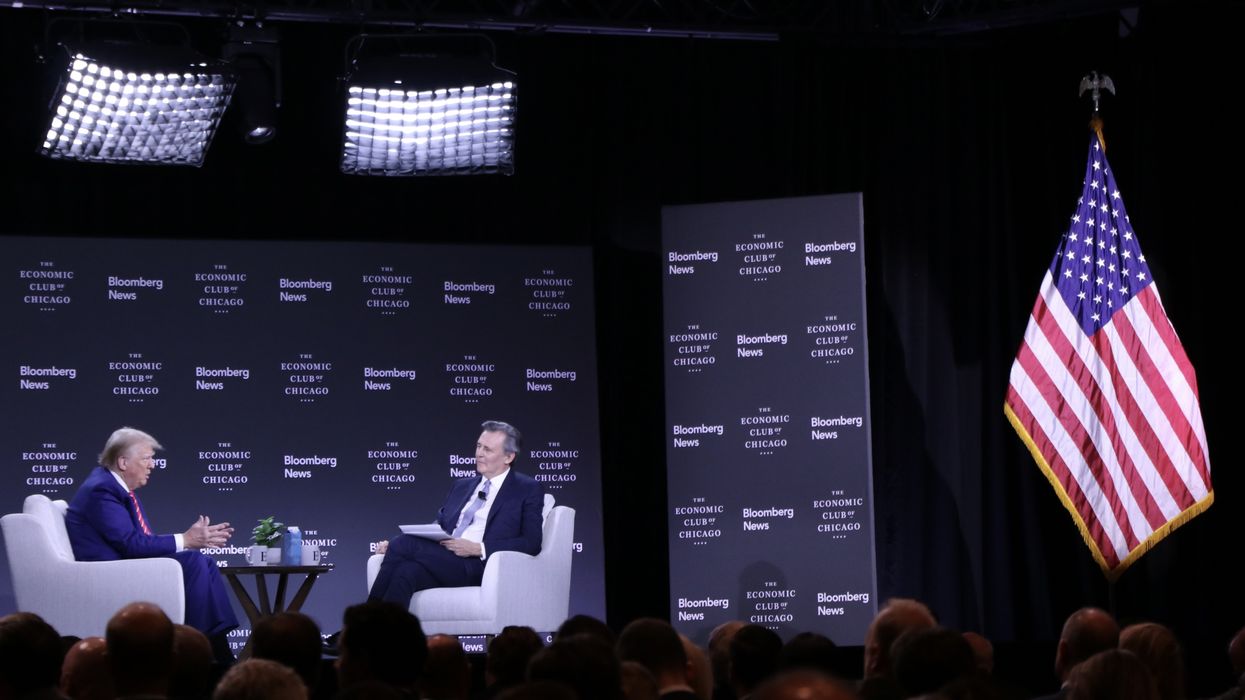Huot-Marchand is a graduate student at Northwestern University’s Medill School of Journalism.
“I do not comment on those things. But let me tell you, if I did, it would be a really smart thing to do,” boasted Donald Trump, when Bloomberg editor-in-chief John Micklethwait asked whether the former president had private phone calls with Vladimir Putin.
Welcomed with high applause and lots of laughs from the members and guests of the Economic Club of Chicago on Oct. 16, Trump bragged about his great relationships with U.S. adversaries and authoritarian leaders Putin, Xi Jinping and Kim Jung Un.
Author and Washington Post editor Bob Woodward, in his new book “War,” claims Trump has had as many as seven private phone calls with the Russian president since he left office in 2021. Woodward also reports that Trump sent Covid-test equipment to the Kremlin for Putin’s personal use in the early weeks of the pandemic when his own population was scrambling to find tests. In his continued awe of the Russian president, Trump gushed during the Chicago event, “Russia has never had a president they respect so much.”
Speaking to a friendly audience in a city and state he will likely lose by large margins, Trump continued to promise to impose high tariffs on foreign goods, a topic that drew criticism from attendees. He also used the nonpartisan forum to blame diplomatic allies for America’s $70 billion trade deficit and tout his isolationist, America First foreign policy.
Trump claimed current international disputes would not exist if he had won the 2020 election. The cause for China’s most recent intimidation tactics toward Taiwan is clear, he said: “The reason they’re doing it now is because they won’t do it later” — presumably meaning if he is re-elected.
He also criticized former presidents for not doing enough to stand up to China. “Barack Hussein Obama, not one president, charged China anything, they said ‘Oh, they’re a third-world nation, they’re developing,’” Trump said. Then he reiterated his recent criticism of Detroit, noting, “We’re a developing country, look at Detroit.”
Trump also lashed out at multiple American allies.
“European nations are screwing us on trade,” he charged, claiming the United States faces a $350 billion trade deficit with the European Union. (According to the Office of the U.S. Trade Representative, the deficit with the E.U. — America’s No. 1 trading partner — stands at $131.1 billion.) Trump has said he would impose a 10 percent tariff on European products. This will have a noticeable negative effect on consumers, according to Micklethwait and many in the audience.
“Tariffs are ultimately passed down to the consumer,” said Janice Boudreau, a certified public accountant at BMM Testlabs. “We're going to have another depression like 1929. I think the country will collapse.”
“I agree with the borders 100 percent,” says Todd Rowden, a lawyer at Taft Stettinius & Hollister, expressing approval of Trump immigration policy positions. “While I agree with some tariffs for strategic purposes, the kinds of things he suggested with Western Europe might be a little bit problematic.”
On NATO, Trump claims the U.S. was paying “almost 100 percent” because “delinquent countries” refused to pay. Whether Trump wants to downsize America’s security role with NATO remains unclear. In the same tone, he said South Korea will have to pay for its own military, mentioning the 40,000 U.S. troops stationed there, and that South Korea has become a “very wealthy country.”
Trump also mentioned that Germany was paying billions to Russia because of the Nord Stream 2 pipeline: “We’re supposed to pay to protect you from this country you’re paying billions to?” Trump insinuated military aid to Ukraine would shrink if he wins in November. Before Russia invaded Ukraine, Germany was paying Gazprom, the Russian company that built NS2. Once the war started, the E.U. made extreme efforts to cut off Russian gas from its energy supply. For a second time, Trump spread a clear lie about having terminated NS2 when, in reality, it was destroyed in September 2022 during the war in Ukraine.
Trump last visited Chicago in August for the National Association of Black Journalists conference. He received heavy criticism then for claiming that Harris had “turned Black.” This time, he addressed a crowd mostly composed of CEOs and business executives. “She is not as smart as Biden,” Trump said, “we're not going to have a country left.”
The crowd cheered loudly.
Rowden observed that the Chicago interview showed a “human side to him” and appreciated the “unfiltered answers” from candidate Trump.
“I am trying to create a space for people to have civil discourse,” says Claire Babineaux-Fontenot, Vice Chair of the ECC. Even if Trump will most likely lose deeply Democratic Illinois, this interview revealed he still has some strong Republican support in the city.




















 From left to right: Gabriel Cardona-Fox, Bud Branch, Joe Concienne
From left to right: Gabriel Cardona-Fox, Bud Branch, Joe Concienne 